
| Next Part | Main Index |


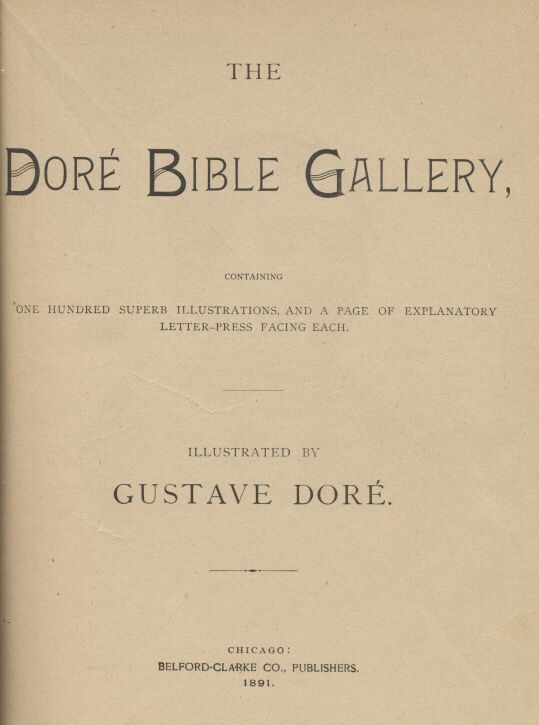
This volume, as its title indicates, is a collection of engravings illustrative of the Bible—the designs being all from the pencil of the greatest of modern delineators, Gustave Dore. The original work, from which this collection has been made, met with an immediate and warm recognition and acceptance among those whose means admitted of its purchase, and its popularity has in no wise diminished since its first publication, but has even extended to those who could only enjoy it casually, or in fragmentary parts. That work, however, in its entirety, was far too costly for the larger and ever-widening circle of M. Dore's admirers, and to meet the felt and often-expressed want of this class, and to provide a volume of choice and valuable designs upon sacred subjects for art-loving Biblical students generally, this work was projected and has been carried forward. The aim has been to introduce subjects of general interest—that is, those relating to the most prominent events and personages of Scripture—those most familiar to all readers; the plates being chosen with special reference to the known taste of the American people. To each cut is prefixed a page of letter-press—in, narrative form, and containing generally a brief analysis of the design. Aside from the labors of the editor and publishers, the work, while in progress, was under the pains-taking and careful scrutiny of artists and scholars not directly interested in the undertaking, but still having a generous solicitude for its success. It is hoped, therefore, that its general plan and execution will render it acceptable both to the appreciative and friendly patrons of the great artist, and to those who would wish to possess such a work solely as a choice collection of illustrations upon sacred themes.
The subject of this sketch is, perhaps, the most original and variously gifted designer the world has ever known. At an age when most men have scarcely passed their novitiate in art, and are still under the direction and discipline of their masters and the schools, he had won a brilliant reputation, and readers and scholars everywhere were gazing on his work with ever-increasing wonder and delight at his fine fancy and multifarious gifts. He has raised illustrative art to a dignity and importance before unknown, and has developed capacities for the pencil before unsuspected. He has laid all subjects tribute to his genius, explored and embellished fields hitherto lying waste, and opened new and shining paths and vistas where none before had trod. To the works of the great he has added the lustre of his genius, bringing their beauties into clearer view and warming them to a fuller life.
His delineations of character, in the different phases of life, from the horrible to the grotesque, the grand to the comic, attest the versatility of his powers; and, whatever faults may be found by critics, the public will heartily render their quota of admiration to his magic touch, his rich and facile rendering of almost every thought that stirs, or lies yet dormant, in the human heart. It is useless to attempt a sketch of his various beauties; those who would know them best must seek them in the treasure—house that his genius is constantly augmenting with fresh gems and wealth. To one, however, of his most prominent traits we will refer—his wonderful rendering of the powers of Nature.
His early wanderings in the wild and romantic passes of the Vosges doubtless developed this inherent tendency of his mind. There he wandered, and there, mayhap, imbibed that deep delight of wood and valley, mountain—pass and rich ravine, whose variety of form and detail seems endless to the enchanted eye. He has caught the very spell of the wilderness; she has laid her hand upon him, and he has gone forth with her blessing. So bold and truthful and minute are his countless representations of forest scenery; so delicate the tracery of branch and stem; so patriarchal the giant boles of his woodland monarchs, that the' gazer is at once satisfied and entranced. His vistas lie slumbering with repose either in shadowy glade or fell ravine, either with glint of lake or the glad, long course of some rejoicing stream, and above all, supreme in a beauty all its own, he spreads a canopy of peerless sky, or a wilderness, perhaps, of angry storm, or peaceful stretches of soft, fleecy cloud, or heavens serene and fair—another kingdom to his teeming art, after the earth has rendered all her gifts.
Paul Gustave Dore was born in the city of Strasburg, January 10, 1833. Of his boyhood we have no very particular account. At eleven years of age, however, he essayed his first artistic creation—a set' of lithographs, published in his native city. The following year found him in Paris, entered as a 7. student at the Charlemagne Lyceum. His first actual work began in 1848, when his fine series of sketches, the "Labors of Hercules," was given to the public through the medium of an illustrated, journal with which he was for a long time connected as designer. In 1856 were published the illustrations for Balzac's "Contes Drolatiques" and those for "The Wandering Jew "—the first humorous and grotesque in the highest degree—indeed, showing a perfect abandonment to fancy; the other weird and supernatural, with fierce battles, shipwrecks, turbulent mobs, and nature in her most forbidding and terrible aspects. Every incident or suggestion that could possibly make the story more effective, or add to the horror of the scenes was seized upon and portrayed with wonderful power. These at once gave the young designer a great reputation, which was still more enhanced by his subsequent works.
With all his love for nature and his power of interpreting her in her varying moods, Dore was a dreamer, and many of his finest achievements were in the realm of the imagination. But he was at home in the actual world also, as witness his designs for "Atala," "London—a Pilgrimage," and many of the scenes in "Don Quixote."
When account is taken of the variety of his designs, and the fact considered that in almost every task he attempted none had ventured before him, the amount of work he accomplished is fairly incredible. To enumerate the immense tasks he undertook—some single volumes alone containing hundreds of illustrations—will give some faint idea of his industry. Besides those already mentioned are Montaigne, Dante, the Bible, Milton, Rabelais, Tennyson's "Idyls of the King," "The Ancient Mariner," Shakespeare, "Legende de Croquemitaine," La Fontaine's "Fables," and others still.
Take one of these works—the Dante, La Fontaine, or "Don Quixote"—and glance at the pictures. The mere hand labor involved in their production is surprising; but when the quality of the work is properly estimated, what he accomplished seems prodigious. No particular mention need be made of him as painter or sculptor, for his reputation rests solely upon his work as an illustrator.
Dore's nature was exuberant and buoyant, and he was youthful in appearance. He had a passion for music, possessed rare skill as a violinist, and it is assumed that, had he failed to succeed with his pencil, he could have won a brilliant reputation as a musician.
He was a bachelor, and lived a quiet, retired life with his mother—married, as he expressed it, to her and his art. His death occurred on January 23, 1883.
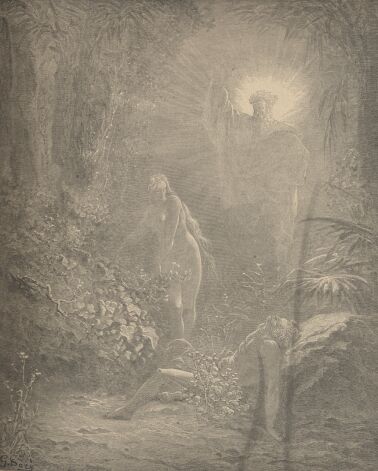
"And the Lord God said, it is not good that the man should be alone; I will make him a helpmeet for him. And the Lord God caused a deep sleep to fall on Adam, and he slept, and he took one of his ribs, and closed up the flesh instead thereof; and the rib which the Lord God had taken from man, made he a woman, and brought her unto the man. And Adam said, This is now bone of my bone and flesh of my flesh: she shall be called Woman, because she was taken out of man. Therefore shall a man leave his father and mother, and shall cleave unto his wife, and they shall be one flesh." Genesis ii, 18, 21-24.
In these few words the Scriptures narrate the creation of the first mother of our race. In "Paradise Lost," the poetic genius of Milton, going more into detail, describes how Eve awoke to consciousness, and found herself reposing under a shade of flowers, much wondering what she was and whence she came. Wandering by the margin of a small lake, she sees her own form mirrored in the clear waters, at which she wonders more. But a voice is heard, leading her to him for whom she was made, who lies sleeping under a grateful shade. It is at this point the artist comes to interpret the poet's dream. Amid the varied and luxurious foliage of Eden, in the vague light of the early dawn, Eve is presented, coy and graceful, gazing on her sleeping Lord, while in the background is faintly outlined the mystic form of Him in whose image they were created.
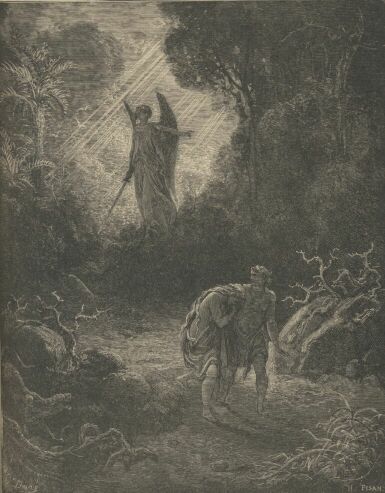
And the Lord God said, Behold, the man is become as one of us, to know good and evil; and now, lest he put forth his hand, and take also of the tree of life, and eat, and live forever: Therefore, the Lord God sent him forth from the garden of Eden, to till the ground from whence he was taken. So he drove out the man; and he placed at the east of the garden of Eden cherubims, and a flaming sword which turned every way, to keep the way of the tree of life.—Genesis iii, 22-24
They, looking back, all the eastern side beheld Of Paradise, so late their happy seat, Waved over by that flaming brand; the gate, With dreadful forces thronged, and fiery arms Some natural tears they dropped, but wiped them soon; The world was all before them, where to choose Their place of rest, and Providence their guide; They, hand in hand, with wandering steps and slow, Through Eden took their solitary way.
Paradise Lost, Book XII.
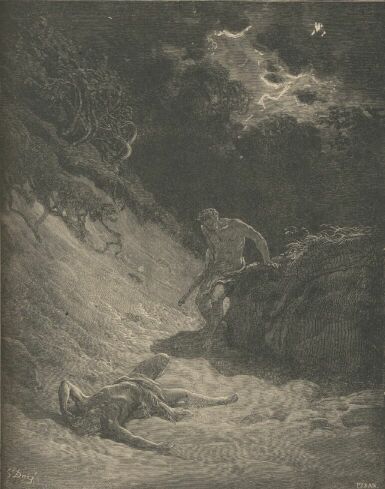
And Adam knew Eve his wife; and she conceived, and bare Cain, and said, I have gotten a man from the Lord. And she again bare his brother Abel. And Abel was a keeper of sheep, but Cain was a tiller of the ground. And in process of time it came to pass, that Cain brought of the fruit of the ground an offering unto the Lord. And Abel, he also brought of the firstlings of his flock and of the fat thereof. And the Lord had respect unto Abel and to his offering: But unto Cain and to his offering he had not respect. And Cain was very wroth, and his countenance fell. And the Lord said unto Cain, Why art thou wroth? and why is thy countenance fallen? If thou doest well, shalt thou not be accepted? and if thou doest not well, sin lieth at the door, and unto thee shall be his desire, and thou shalt rule over him. And Cain talked with Abel his brother: and it came to pass,—when they were in the field, that Cain rose up against Abel his brother, and slew him.
And the Lord said unto Cain, Where is Abel thy brother? And he said, I know not Am I my brother's keeper? And he said, What hast thou done? the voice of thy brother's blood crieth unto me from the ground. And now art thou cursed from the earth, which hath opened her mouth to receive thy brother's blood from thy hand; When thou tillest the ground, it shall not henceforth yield unto thee her strength; a fugitive and a vagabond shalt thou be in the earth. And Cain said unto the Lord, My punishment is greater than I can bear. Behold, thou hast driven me out this day from the face of the earth and from thy face shall I be hid; and I shall be a fugitive and a vagabond in the earth; and it shall come to pass, that every one that findeth me shall slay me. And the Lord said unto him, Therefore whosoever slayeth Cain, vengeance shall be taken on him sevenfold. And the Lord set a mark upon Cain, lest any finding him should kill him.
And Cain went out from the presence of the Lord, and dwelt in the land of Nod, on the east of Eden.—Genesis iv, 1-16
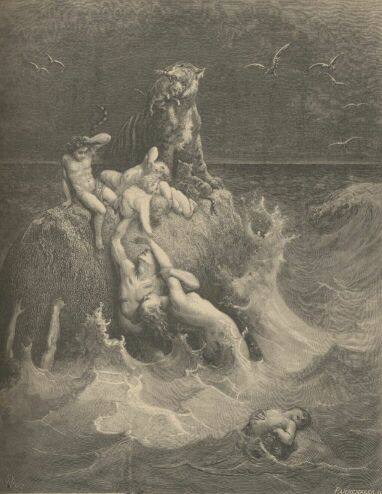
In the six hundredth year of Noah's life, in the second month, the seventeenth day of the month, the same day were all the fountains of the great deep broken up, and the windows of heaven were opened. And the rain was upon the earth forty days and forty nights.
In the selfsame day entered Noah, and Shem, and Ham, and Japheth, the sons of Noah, and Noah's wife, and the three wives of his sons with them, into the ark; they, and every beast after his kind, and all the cattle after their kind, and every creeping thing that creepeth upon the earth after his kind, and every fowl after his kind, every bird of every sort. And they went in unto Noah into the ark, two and two of all flesh, wherein is the breath of life. And they that went in, went in male and female of all flesh, as God had commanded him: and the Lord shut him in.
And the flood was forty days upon the earth; and the waters increased, and bare up the ark, and it was lift up above the earth. And the waters prevailed, and were increased, greatly upon the earth; and the ark went upon the face of the waters. And the waters prevailed exceedingly upon the earth; and all the high hills, that were under the whole heaven, were covered. Fifteen cubits upward did the waters prevail; and the mountains were covered. And all flesh died that moved upon the earth, both of fowl, and of cattle, and of beast, and of every creeping thing that creepeth upon the earth, and every man; all in whose nostrils was the breath of life, of all that was in the dry land, died. And every living substance was destroyed which was upon the face of the ground, both man and cattle, and the creeping things, and the fowl of the heaven; and they were destroyed from the earth; and Noah only remained alive, and they that were with him in the ark.
And the waters prevailed upon the earth an hundred and fifty days.—Genesis vii, 11-24.
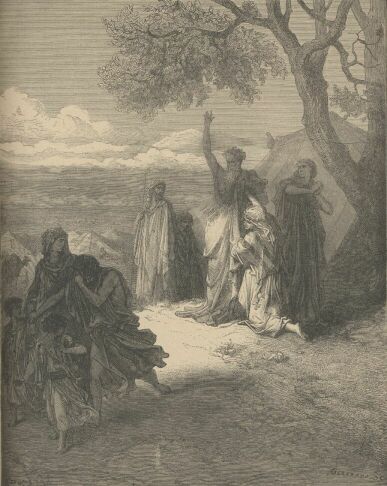
And the sons of Noah, that went forth of the ark, were Shem, and Ham, and Japheth; and Ham is the father of Canaan. These are the three sons of Noah: and of them was the whole earth overspread.
And Noah began to be an husbandman, and he planted a vineyard: And he drank of the wine, and was drunken; and he was uncovered within his tent. And Ham, the father of Canaan, saw the nakedness of his father, and told his two brethren without. And Shem and Japheth took a garment, and laid it upon both their shoulders, and went backward, and covered the nakedness of their father; and their faces were backward, and they saw not their father's nakedness. And Noah awoke from his wine, and knew what his younger son had done unto him. And he said, Cursed be Canaan; a servant of servants shall he be unto his brethren. And he said, Blessed be the Lord God of Shem; and Canaan shall be his servant. God shall enlarge Japheth, and he shall dwell in the tents of Shem; and Canaan shall be his servant.—Genesis ix, 18-27.
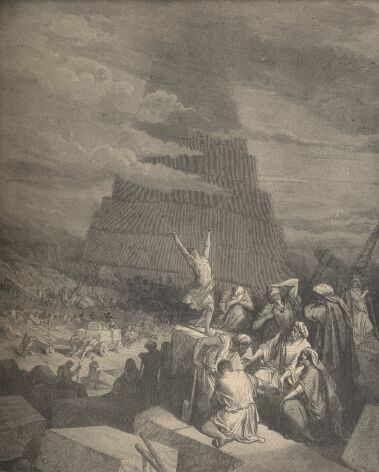
And the whole earth was of one language, and of one speech.
And it came to pass as they journeyed from the east, that they found a plain in the land of Shinar; and they dwelt there. And they said one to another, Go to, let us make brick, and burn them thoroughly. And they had brick for stone, and slime had they for mortar. And they said, Go to, let us build us a city and a tower, whose top may reach unto heaven; and let us make us a name, lest we be scattered abroad upon the face of the whole earth.
And the Lord came down to see the city and the tower which the children of men builded. And the Lord said, Behold, the people is one, and they have all one language; and this they begin to do: and now nothing will be restrained from them, which they have imagined to do. Go to, let us go down, and there confound their language, that they may not understand one another's speech.
So the Lord scattered them abroad from thence upon the face of all the earth: and they left off to build the city.
Therefore is the name of it called Babel; because the Lord did there confound the language of all the earth: and from thence did the Lord scatter them abroad upon the face of all the earth.—Genesis xi, 1-9.
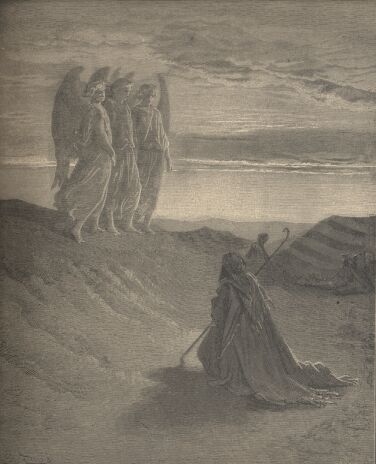
In the selfsame day was Abraham circumcised, and Ishmael his son. And all the men of his house, born in the house, and bought with money of the stranger, were circumcised with him.
And the Lord appeared unto him in the plains of Mamre: and he sat in the tent door in the heat of the day; and he lift up his eyes and looked, and, lo, three men stood by him: and when he saw them, he ran to meet them from the tent door, and bowed himself toward the ground, and said, My Lord, if now I have found favour in thy sight, pass not away, I pray thee, from thy servant: let a little water, I pray you, be fetched, and wash your feet, and rest yourselves under the tree: And I will fetch a morsel of bread, and comfort ye your hearts; after that ye shall pass on: for therefore are ye come to your servant. And they said, So do, as thou hast said.
And Abraham hastened into the tent unto Sarah, and said, Make ready quickly three measures of fine meal, knead it, and make cakes upon the hearth. And Abraham ran unto the herd, and fetched a calf tender and good, and gave it unto a young man; and he hasted to dress it. And he took butter, and milk, and the calf which he had dressed, and set it before them; and he stood by them under the tree, and they did eat.—Genesis xvii, 26, 27; xviii 1-8.
Be not forgetful to entertain strangers: for thereby some have entertained angels unawares.—Hebrews xiii, 2.
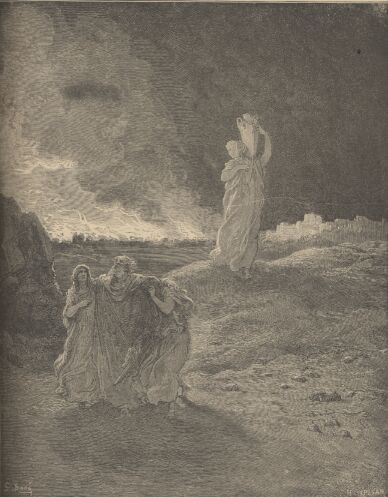
And when the morning arose, then the angels hastened Lot, saying, Arise, take thy wife, and thy two daughters, which are here; lest thou be consumed in the iniquity of the city. And while he lingered, the men laid hold upon his hand, and upon the hand of his wife, and upon the hand of his two daughters; the Lord being merciful unto him: and they brought him forth, and set him without the city.
And it came to pass, when they had brought them forth abroad, that he said, Escape for thy life; look not behind thee, neither stay thou in all the plain; escape to the mountain, lest thou be consumed. And Lot said unto them, Oh, not so, my Lord. Behold now, thy servant hath found grace in thy sight, and thou hast magnified thy mercy, which thou hast shewed unto me in saving my life; and I cannot escape to the mountain, lest some evil take me and I die. Behold now this city is near to flee unto, and it is a little one: Oh, let me escape thither (is it not a little one?) and my soul shall live. And he said unto him, See, I have accepted thee concerning this thing also, that I will not overthrow this city, for the which thou hast spoken. Haste thee, escape thither; for I cannot do anything till thou be come thither.
Therefore the name of the city was called Zoar.
The sun was risen upon the earth when Lot entered unto Zoar. Then the Lord rained upon Sodom and upon Gomorrah brimstone and fire from the Lord out of heaven; and he overthrew those cities, and all the plain, and all the inhabitants of the cities, and that which grew upon the ground.
But his wife looked back from behind him, and she became a pillar of salt.
And Abraham gat up early in the morning to the place where he stood before the Lord and he looked toward Sodom and Gomorrah, and toward all the land of the plain, and beheld, and lo, the smoke of the country went up as the smoke of a furnace.—Genesis xix, 15-28.
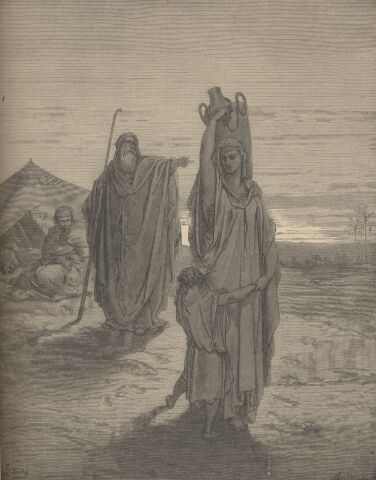
And the Lord visited Sarah as he had said, and the Lord did unto Sarah as he had spoken. For Sarah conceived, and bare Abraham a son in his old age, at the set time of which God had spoken to him. And Abraham called the name of his son that was born unto him, whom Sarah bare to him, Isaac. And Abraham circumcised his son Isaac, being eight days old, as God had commanded him. And Abraham was an hundred years old, when his son Isaac was born unto him.
And Sarah said, God hath made me to laugh, so that all that hear will laugh with me. And she said, Who would have said unto Abraham, that Sarah should have given children suck? for I have born him a son in his old age. And the child grew, and was weaned: and Abraham made a great feast the same day that Isaac was weaned.
And Sarah, saw the son of Hagar, the Egyptian, which she had born unto Abraham, mocking. Wherefore she said unto Abraham, Cast out this bondwoman and her son; for the son of this, bondwoman shall not be heir with my son, even with Isaac.
And the thing was very grievous in Abraham's sight because of his son. And God said unto Abraham, Let it not be grievous in thy sight because of the lad, and because of thy bondwoman; in all that Sarah hath said unto thee, hearken unto her voice; for in Isaac shall thy seed be called. And also of the son of the bondwoman will I make a nation, because he is thy seed.
And Abraham rose up early in the morning, and took bread, and a bottle of water, and gave it unto Hagar, putting it on her shoulder, and the child, and sent her away: and she departed, and wandered in the wilderness of Beer-sheba.—Genesis xxi, 1-14.
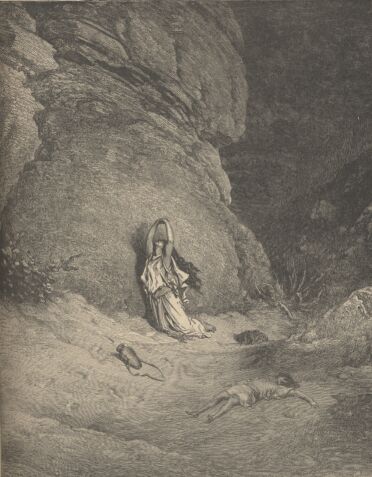
And Abraham rose up early in the morning, and took bread, and a bottle of water, and gave it unto Hagar, putting it on her shoulder, and the child, and sent her away; and she departed, and wandered in the wilderness of Beer-sheba. And the water was spent in the bottle, and she cast the child under one of the shrubs. And she went and sat her down over against him a good way off, as it were a bow-shot: for she said, Let me not see the death of the child. And she sat over against him, and lifted up her voice and wept. And God heard the voice of the lad; and the angel of God called to Hagar out of heaven, and said unto her, What aileth thee, Hagar? fear not, for God hath heard the voice of the lad where he is. Arise, lift up the lad, and hold him in thine hand; for I will make him a great nation. And God opened her eyes, and she saw a well of water; and she went, and filled the bottle with water, and gave the lad drink. And God was with the lad; and he grew, and dwelt in the wilderness, and became an archer. And he dwelt in the wilderness of Paran: and his mother took him a wife out of the land of Egypt.—Genesis xxi. 14-21.
| Next Part | Main Index |
EDIZIONI DI PUBBLICO DOMINIO (HTML)
- Alighieri - La Divina Commedia
RISORSE DAL WEB:
Encyclopaedia Britannica 1911 - PDF